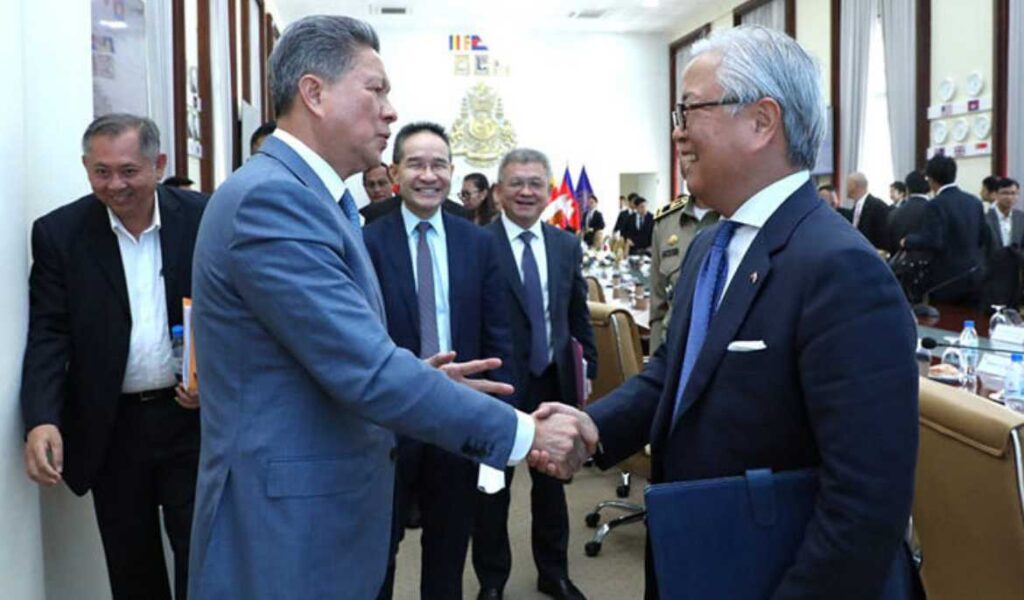Cambodia and Japan have reaffirmed their commitment to strengthening economic ties and improving the investment climate, following the 30th Meeting of the Cambodia-Japan Joint Committee held on Wednesday at the Council for the Development of Cambodia (CDC).
The meeting was co-chaired by Deputy Prime Minister Sun Chanthol, First Vice Chairman of the CDC, and Ueno Atsushi, Japanese Ambassador to Cambodia. More than 200 representatives from ministries, institutions, the Japan Business Association in Cambodia (JBAC), JETRO, JICA, AMEICC, and Japanese companies attended both in person and online.
Established under the framework of the Agreement on the Liberalization, Promotion and Protection of Investment, the joint committee serves as a mechanism for direct dialogue between the Cambodian government and Japanese investors.
The 30th session focused on key business challenges and opportunities across tax, customs, logistics, energy, trade, environmental regulations, labour and security.
Deputy Prime Minister Chanthol welcomed the Japanese delegation, stressing the government’s appreciation for the trust shown by Japanese investors. “The Royal Government of Cambodia values the confidence of Japanese companies that continue to invest, expand and strengthen operations in the Kingdom,” he said, while calling for greater cooperation to attract further high-quality investments.
Ambassador Atsushi extended condolences over the recent loss of Cambodian soldiers in the border conflict with Thailand, announcing that Japan has committed $1.8 million in emergency humanitarian aid.
He also underlined Japan’s continued support for peace and stability in Cambodia and expressed appreciation for the Cambodian government’s responsiveness to investors.
“Japan welcomes the facilitation and responsibility shown by the CDC and relevant ministries in addressing the needs of Japanese investors,” the Ambassador said.
The session highlighted Japan’s role as a long-term and reliable investor in Cambodia, with Japanese companies active in manufacturing, energy, logistics, finance and digital services.
Both sides agreed on the need to expand investment promotion programmes, with Chanthol urging the Japanese Embassy to work with the government in raising awareness of Cambodia’s investment incentives and opportunities among a wider pool of Japanese businesses.
The joint committee meeting reinforced Cambodia’s strategic goal of positioning itself as a stable, investor-friendly hub in ASEAN, while ensuring Japanese firms continue to view the Kingdom as a competitive and secure base for operations.
As Cambodia and Japan marked the 30th Meeting of the Joint Committee under the Agreement on Liberalisation, Promotion and Protection of Investment, a leading policy analyst has called on Cambodia to sharpen its competitive edge to attract more Japanese capital.
Seun Sam, a policy analyst at the Royal Academy of Cambodia, told Khmer Times that Cambodia must learn from its neighbours, particularly Thailand and Vietnam, which have been more accommodating towards Japanese tourists and investors.
“Cambodia should consider exempting visas for Japanese tourists and investors, at least for short stays under 15 days. This is a small but meaningful step that can enhance Cambodia’s attractiveness,” he said.
He stressed that Cambodia must not only promote investment opportunities but also address systemic challenges that discourage foreign businesses from setting up operations.
“In Vietnam, investors find the authorities very accommodating. They ensure that investors comply with laws, such as paying taxes and creating jobs, but they also make the process smooth and predictable,” he explained. “In Cambodia, however, investors still face problems such as unofficial payments and unresolved bureaucratic hurdles, which undermine confidence.”
Sam added that Japanese investors, like their counterparts from other countries, are highly discerning and make careful comparisons before choosing their investment destinations.
The analyst emphasised that Cambodia must adopt a proactive approach by identifying and addressing the obstacles foreign investors face, ranging from regulatory red tape to corruption.
“To attract foreign investors, whether from Japan, China, Korea, or the US, Cambodia should study neighbouring countries’ best practices, increase competitiveness, and coordinate policies more effectively,” he said. The 30th Joint Committee meeting highlighted the enduring economic partnership between Cambodia and Japan.



